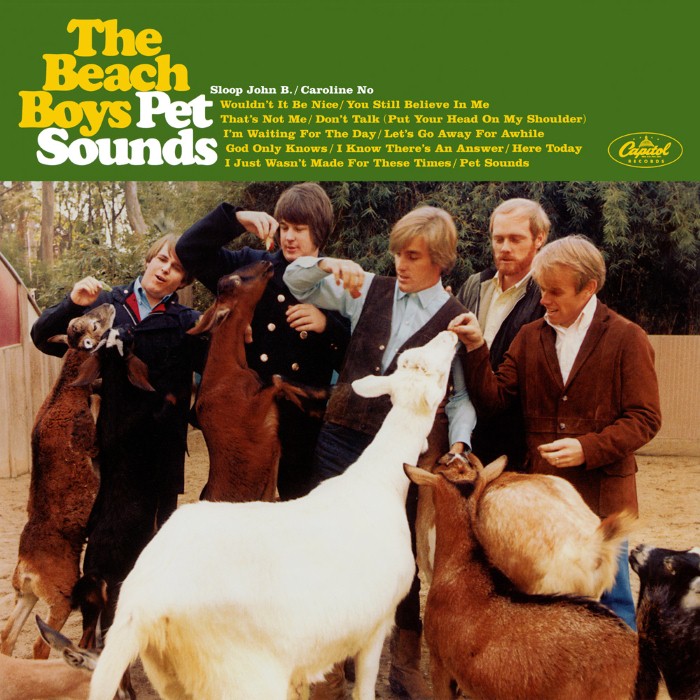Pet Sounds by The Beach Boys

Pet Sounds is the eleventh studio album by the American rock band The Beach Boys, released May 16, 1966, on Capitol Records. It has since been recognized as one of the most influential records in the history of popular music and one of the best albums of the 1960s, including songs such as "Wouldn't It Be Nice" and "God Only Knows". Pet Sounds was created several months after Brian Wilson had quit touring with the band in order to focus his attention on writing and recording. In it, he wove elaborate layers of vocal harmonies, coupled with sound effects and unconventional instruments such as bicycle bells, buzzing organs, harpsichords, flutes, Electro-Theremin, dog whistles, trains, Hawaiian-sounding string instruments, Coca-Cola cans and barking dogs, along with the more usual keyboards and guitars. Although Pet Sounds has been credited as one of the most important albums of all time, its initial release failed to reach gold status, where it reached number 10 on the American Billboard 200. A heralding album in the emerging psychedelic rock style, Pet Sounds has been championed and emulated for its dramatic and revolutionary baroque instrumentation. It has been ranked at number 1 in several music magazines' lists of greatest albums of all time, including New Musical Express, The Times and Mojo Magazine. It was ranked number 2 in Rolling Stone's 500 Greatest Albums of All Time list.
<b>100 Best Albums</b> No matter where you’re at in life, stepping into <i>Pet Sounds</i> can feel like stepping back into childhood. The colours are brighter, the scale bigger. There are moments of wonder and excitement (“Wouldn’t It Be Nice”) and moments of profound pain (“I Just Wasn’t Made for These Times”). Brian Wilson’s arrangements brought a complexity to rock music that nobody had heard before, but they also captured a simple, poetic point: When you’re young, everything hits with the weight of an orchestra. Wilson was a child of Southern California and Disney, of the great suburban myths that shaped America after World War II: The joke is that his brother Dennis was the only Beach Boy who actually surfed, while the rest just held boards to sell a story. At a mid-’60s moment when bands like The Velvet Underground were starting to use pop to explore rough, bracing realities, <i>Pet Sounds</i> reached back to the fantasies of ’30s pop and ’50s exotica, of old Hollywood and early television. And as sacred as the album’s mood is (Wilson called his next project, <i>Smile</i>, a “teenage symphony to God”), it makes sense that its co-lyricist, Tony Asher, had come from advertising: No matter how ambitious he got, he also knew he needed to project something neat, immediate and universal. Of all <i>Pet Sounds</i>’ legacies, the most profound is the idea that pop music—something accessible and extroverted—could be used to express deep, internal worlds. Wilson’s experiments with LSD aren’t obvious in any garish, cartoonish way. But you can hear him trying to excavate feelings buried so deep in the underbrush of shame and memory that seeking them out is an adventure on par with any. <i>Pet Sounds</i> is a reminder that the core of courage is innocence, and that just because you can’t change the past doesn’t mean it doesn’t still hurt.
